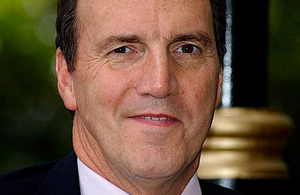New law will keep separating parents and couples away from court
Separating parents and couples will be helped to avoid stressful court battles under a new law being introduced by the government.

Family Justice Minister Simon Hughes today set out the importance of the proposed change – in the week of the year when lawyers say more people start to seek a divorce than any other.
The first working day in January is known as ”Divorce Day” because of the surge of enquiries lawyers receive after the Christmas break.
The government is introducing major changes designed to ensure that in future separating parents and couples will first consider using mediation to resolve the issues around divorce and separation - like splitting property or agreeing child contact times – rather than fighting over it in court.
Mediation involves couples holding discussions, led by a trained and certified mediator, to reach agreements which both of them are prepared to live with, rather than having them dictated by the court. Couples can then ask a court to consider and make their agreement into a legally binding and enforceable court order.
Family Justice Minister Simon Hughes said:
Mediation works and we are committed to making sure that more people make use of it, rather than go through the confrontational and stressful experience of going to court.
When people separate we want them to do it in the least damaging way for everyone involved, especially children. That is why we want them to use the excellent mediation services available to agree a way forward, rather than have one forced upon them.
The proposed new law is included in the Children and Families Bill which is currently being considered by Parliament. This seeks to change the process so that a person who wants to apply for a court order about a children or financial matter must first attend a mediation information and assessment meeting (MIAM).
Exemptions from this requirement will apply, such as where there is evidence of domestic violence.
Statistics show that mediation can help people to reach longer lasting solutions for the better good of any children involved. It can also be cheaper and quicker than taking a battle to court.
The government continues to make millions of pounds of public funding available to pay for family mediation for those who are eligible. In 2012 more than 17,000 people successfully used legally aided mediation.
Notes to editors
- The proposed measure is part of the Children and Families Bill which is currently progressing through Parliament. The family justice provisions in the Bill completed Report stage in the House of Lords in December. The remaining stages of the Bill are expected to be completed in early 2014.
- The average legal aid cost of resolving a private family dispute following a relationship breakdown is approximately £500 per couple through mediation. This is, compared to £4,000 per person for issues settled through the courts. The average time for a mediated case is 110 days compared to 435 days for non-mediated cases.
- Last year more than 17,000 people successfully used publicly funded mediation with only six per cent needing further legal services, compared to 21 per cent of those who didn’t use mediation. ‘Sustainability of mediation and legal representation in private family law cases: Analysis of legal aid administrative datasets, Quartermain [MoJ 2011]’.
- Mediation won’t be right for everyone. Some people will be able to sort out their own disputes without using mediation or going to court. In certain other circumstances – such as with domestic violence or child protection concerns - legal action through the courts may be needed.
- Information for anyone considering divorce or separation, advice on some of the support and services available.
- More information on family mediation and reaching agreements can also be found on GOV.UK and the Sorting Out Separation web app.
- Searches for ‘divorce’ on GOV.UK are 55 per cent higher in early January than in early December (456 searches in first week of January 2013 compared to 294 in first week of December 2012).
- For more information please call the Ministry of Justice press office on 020 3334 3536.
Updates to this page
-
Minor changes to the press release.
-
First published.